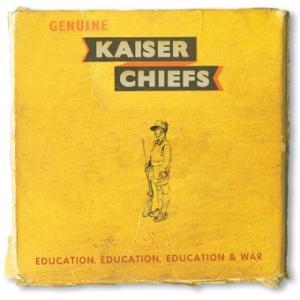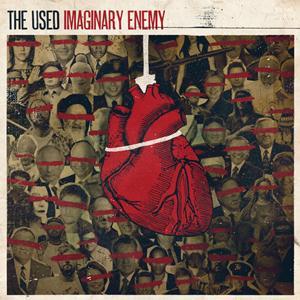Rebecca Docter’s Review: Cope B-Sides by Manchester Orchestra
Grade: A
While “Cope” presented the newly improved, thrashing version of the Atlanta-based quartet, the B-Sides of the record are an entirely different ordeal. Like a more monumental take on vocalist Andy Hull’s side project turned full-time endeavor Bad Books (which he fronts with singer-songwriter Kevin Devine), “Never Really Been Another Way Out” brings out the stylings of Hull and company’s older works (see “Where Have You Been”). “After The Scripture” sounds like a resounding heartache recorded, evening out the end of “Cope.” Hull’s vocals sound far away, almost like the listener is eavesdropping on a forbidden conversation. Sounding like an gorgeous orchestral mess, the two tracks radiate the broad spectrum Manchester Orchestra covers, showing both old fans and newcomers just what the band is capable of.
Gerald Ducote’s Review: “Education, Education, Education & War” by Kaiser Chiefs
Grade: D-
Kaiser Chiefs’ fifth album “Education, Education, Education & War” is nearly an hour of overly ambitious rock. The band’s sound is best described as The Clash but with nothing to be angry about. A majority of the album’s lyrics have to do with the plight of the workingman, a sentiment I seriously doubt most of the band’s members have had to experience. The album plays like “London Calling” without any of the angst. “Education” is a call to pointless rebellion. There are some stylistic decisions that the album may have been better without. In “Cannons,” after five minutes of aggressive group-singing, the songs shifts to a spoken-word excerpt reminiscent of Dickens, but I feel might actually be a callback to “Little Acorns” from The White Stripes’ 2003 opus “Elephant.”
Will Kallenborn’s Review: Noah
Grade: B
There is an interesting tradition of unconventional directors making biblical epics. Martin Scorsese made “The Last Temptation of Christ” and Pier Paolo Pasolini made “The Gospel According to St. Matthew” and now Darren Aronofsky has made “Noah.” I enjoyed “Noah” a great deal more than I thought I would. The imagery is powerful and striking. The cinematography is crisp and powerful. In many ways, it reads like a Terrance Malick movie with the depth of symbolism. The movie’s faults lie in its identity crisis. Is it a reverent Bible story, a summer blockbuster or a surreal art house film? There are elements of all of these there, and they sometimes clash. Also, the film loses some steam in the third act, yet comes together at the end. It is interesting to see directors make movies like this, and I hope that it is a tradition that continues.
Meg Ryan’s Review: Imaginary Enemy by The Used
Grade: D+
The Used’s new album, “Imaginary Enemy,” is all about revolution. However, this is a cause that doesn’t seem worth joining. While the lyrics talk about making a change and becoming better, the actual music and sound doesn’t get there. The songs either sound like typical pop-rock or wannabe-screamo, both not entirely too great to listen to. The record lineup is also a strange combination bouncing back and forth between happy to be moving on and bitter that moving on is the situation. The constant back and forth and intermittently being yelled at makes for a record not worthy of wasting time on. While The Used is sending a good message to move on and be happy, it’s doing a very bad job at conveying it.
Panya Kroun’s Review: “Baby” by White Hinterland
Grade: B-
As the old adage suggests, the third time’s the charm, and Casey Dienel’s third full-length release through her musical alter ego White Hinterland, “Baby,” does not disappoint. On “Baby,” Dienel seems to have found the musical identity she struggled to maintain on her previous releases. She experiments with a curious jumble of solemn piano solos, experimental electro tracks and soulful R&B numbers and ties them all together with her trademark howling and crooning. Her vocal presence is much stronger on this release than it was on albums past, which is probably why “Baby” sounds more cohesive and powerful than anything she’s done before. At times, her voice is almost too powerful, and the voiceless sounds that follow it sound relatively underwhelming. “Baby” would benefit from just a little more thematic balance, but it’s certainly a step in the right direction.
Joshua Jackson’s Review: “La Gárgola” by Chevelle
Grade: F
Alternative metal band Chevelle took a different approach to its seventh album, “La Gárgola.” The band usually opens with an aggressive, yet melodic track, but opts for a haunting effect on “Ouija Board.” The record then shifts into a series of songs that sound identical such as “An Island” and “Take Out the Gunman.” There are few moments that beckon back to Chevelle’s high days of “Vena Sera.” The band falls into the category of “aggressive band” with poorly arranged slow songs like “One Ocean” and “Twinge,” which depend on catchy melodies instead of lyrical depth. “La Gárgola” is a broken record filled with repetitious guitar chords, basic drum patterns and emotionless vocals. The album is a drastic step down in the band’s almost 20-year career. Even die-hard fans of the band may want to forget this record was released.
Reveille Ranks: April 2, 2014
April 2, 2014

Manchester_Orchestra_Cope.jpg
More to Discover















